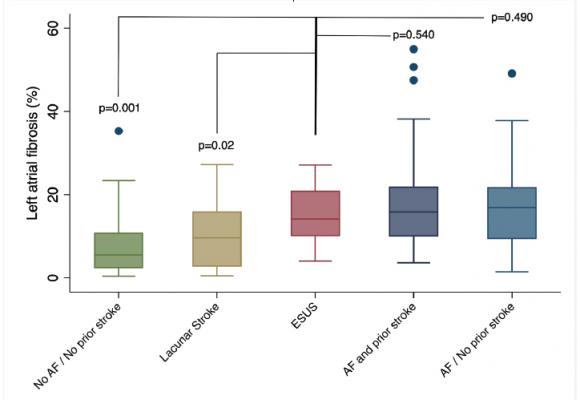
May 19, 2020 — Atrial disease has been implicated in embolic stroke of undetermined source (ESUS) and a late-breaking study at the Heart Rhythm Society (HRS) 2020 Science virtual meeting hypothesized ESUS patients with advanced atrial disease are at higher risk for recurrent stroke or incident atrial fibrillation (AF).
The study found ESUS patients with fibrosis, about 12 percent, had a significantly higher proportion of the combined outcome of recurrent stroke or new AF compared to those with fibrosis , less than 12 percent (5 vs. 22.6%; p=0.045).
Patients with ESUS have atrial fibrosis comparable to that seen in AF. Atrial fibrosis in about 12% may help identify ESUS patients who may benefit from anticoagulation for secondary prevention, said Nazem Akoum, M.D., MS, FHRS, attending physician, University of Washington Medical Center, Heart Institute of Edmonds, Seattle. He presented the study "Atrial Fibrosis Predicts Recurrent Stroke Or New Atrial Fibrillation In Patients With Embolic Stroke Of Undetermined Source - A Multi-Center Study," at HRS.
Researchers quantified atrial fibrosis using late-gadolinium enhancement MRI. Atrial fibrosis was reported as a percentage of the left atrial wall volume and compared across various groups: healthy controls, lacunar stroke, ESUS and known AF with or without prior stroke. They followed ESUS patients prospectively for 30 months for recurrent ischemic stroke or new AF.
The study enrolled 201 patients, 101 without AF: 35 healthy controls, 15 lacunar strokes, 51 patients with ESUS; and 100 patients with AF: 50 with prior stroke and 50 without prior stroke. Atrial fibrosis was significantly higher in ESUS compared to lacunar stroke patients (14.69±6.39% vs. 10.76±8.30; p = 0.02) and to healthy controls (8.1±7.9%; <0.0001). ESUS patients had comparable fibrosis to patients with AF with (17.9±11.4%) or without prior stroke (16.6±9.2%; p=NS for both) (Figure 1). In prospective follow up of ESUS, 5 patients (9.8%) had recurrent stroke and 5 had incident AF (9.8%).
Find links to all the Heart Rhythm Society 2020 Late-Breaking Clinical Trials in Electrophysiology


 December 19, 2025
December 19, 2025 









